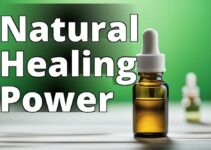Are you curious about the health benefits of phytocannabinoids? Phytocannabinoids, natural compounds found in the cannabis plant, interact with the human body's endocannabinoid system, offering a diverse range of potential health benefits. This surge of interest in the therapeutic properties of phytocannabinoids aligns with the growing focus on holistic health and wellness.
Discover the Health Benefits of Phytocannabinoids
By reading this article, you will learn:
1. Pain relief, stress reduction, anti-inflammatory effects, neuroprotection, and potential in managing seizures and epilepsy
– Phytocannabinoids offer various health benefits including pain management, anxiety reduction, and anti-inflammatory effects.
2. Different types of phytocannabinoids and their varied health benefits
– There are various types of phytocannabinoids like CBD, THC, CBG, CBN, and CBC, each offering different health benefits and effects.
3. Methods of incorporating phytocannabinoids for health benefits and considerations for safe usage
– You will understand the various methods of incorporating phytocannabinoids for health benefits and the safety considerations associated with their usage.
Definition and Types of Phytocannabinoids
Phytocannabinoids are a diverse group of chemical compounds found in the cannabis plant, with well-known examples including cannabidiol (CBD) and tetrahydrocannabinol (THC). There are over 100 different phytocannabinoids identified in cannabis, each potentially offering unique effects on the body and distinct health benefits.
Brief History and Cultural Usage
Cannabis has a long history of cultural and medicinal use, dating back thousands of years. Ancient civilizations recognized the therapeutic potential of cannabis, using it for purposes such as pain relief, relaxation, and spiritual ceremonies. The modern exploration of phytocannabinoid benefits builds upon this rich historical legacy.
Importance of Exploring Phytocannabinoid Benefits
Given the increasing interest in natural and holistic approaches to health, understanding the potential benefits of phytocannabinoids is crucial. As more research emerges, it becomes clear that phytocannabinoids have the potential to play a significant role in promoting overall well-being and addressing various health concerns.
The Endocannabinoid System
The endocannabinoid system is a complex network of receptors, enzymes, and endocannabinoids that plays a crucial role in regulating various physiological processes within the body, ensuring that the body's internal environment remains stable despite external changes.
Role in Regulating Neurological and Physiological Processes
The endocannabinoid system influences the function of the nervous system, immune system, and various organs, demonstrating its widespread impact on overall health and well-being.
Relevance to Phytocannabinoid Health Benefits
Phytocannabinoids interact with the endocannabinoid system, mimicking the effects of endocannabinoids produced by the body. This interaction forms the basis for the potential health benefits of phytocannabinoids and their impact on the body's regulatory processes.
Health Benefits of Phytocannabinoids
Phytocannabinoids offer a diverse range of potential health benefits, making them a subject of significant interest in the health and wellness community.
Pain Management and Relief
Studies have shown that phytocannabinoids, particularly CBD, may offer relief from chronic pain conditions. By interacting with receptors in the endocannabinoid system, phytocannabinoids have demonstrated the potential to alleviate discomfort and improve pain management.
Anxiety and Stress Reduction
Phytocannabinoids have been explored for their anxiolytic properties, showing promise in reducing anxiety and stress levels. CBD, in particular, has garnered attention for its potential in promoting relaxation and emotional well-being.
Anti-inflammatory Effects
Phytocannabinoids, especially CBD, have been studied for their anti-inflammatory properties, potentially offering a natural approach to managing inflammation in the body.
Neuroprotective Properties
Emerging research suggests that phytocannabinoids may have neuroprotective effects, with implications for conditions related to neurodegeneration and cognitive function.
Potential in Managing Seizures and Epilepsy
CBD has gained significant attention for its potential in managing seizures, especially in certain forms of epilepsy that are resistant to traditional treatments. Clinical trials have shown promising results in this area.
Impact on Sleep Quality and Patterns
Phytocannabinoids have been studied for their potential to improve sleep quality and regulate sleep patterns, offering a natural alternative for individuals struggling with sleep-related issues.
Appetite Stimulation and Regulation
Cannabinoids, particularly THC, have been associated with stimulating appetite, making them potentially beneficial for individuals with conditions that lead to appetite loss.
Phytocannabinoid Varieties and Their Effects
Understanding the different types of phytocannabinoids is essential for comprehending their varied effects on the body.
| Phytocannabinoid | Description |
|---|---|
| CBD (Cannabidiol) | Known for its potential therapeutic applications without causing psychoactive effects. |
| THC (Tetrahydrocannabinol) | The primary psychoactive compound in cannabis, offering potential health benefits. |
| CBG (Cannabigerol) | Shows promise in various areas, including potential anti-inflammatory and neuroprotective effects. |
| CBN (Cannabinol) | Studied for its potential sedative effects, relevant in the context of sleep and relaxation. |
| CBC (Cannabichromene) | Researched for its potential anti-inflammatory and analgesic properties. |
| Phytocannabinoid | Description |
|---|---|
| CBD (Cannabidiol) | Known for its potential therapeutic applications without causing psychoactive effects. |
| THC (Tetrahydrocannabinol) | The primary psychoactive compound in cannabis, offering potential health benefits. |
| CBG (Cannabigerol) | Shows promise in various areas, including potential anti-inflammatory and neuroprotective effects. |
| CBN (Cannabinol) | Studied for its potential sedative effects, relevant in the context of sleep and relaxation. |
| CBC (Cannabichromene) | Researched for its potential anti-inflammatory and analgesic properties. |
Methods of Incorporating Phytocannabinoids for Health Benefits
There are various methods for consuming phytocannabinoids, each with its own implications for bioavailability and onset of effects.
CBD Oil and Tinctures
Popular for their ease of use and ability to deliver precise dosages of phytocannabinoids.
Edibles and Infused Food Products
Offer a discreet and enjoyable way to consume phytocannabinoids, with effects that can last longer than other methods.
Topical Applications: Creams, Lotions, and Balms
Allow for targeted application of phytocannabinoids, suitable for localized relief.
Vaping and Inhalation Methods
Provide rapid onset of effects, making them a preferred choice for individuals seeking immediate relief.
Smoking and Herbal Consumption
While less common than other methods, remain a traditional way of ingesting phytocannabinoids.
Dosage Considerations and Administration Guidelines
Understanding proper dosage and administration guidelines is essential for maximizing the health benefits of phytocannabinoids while minimizing potential risks.
Risks, Safety, and Side Effects
While phytocannabinoids offer potential health benefits, it is crucial to consider safety and potential risks associated with their use.
Potential Interactions with Medications
Phytocannabinoids may interact with certain medications, highlighting the importance of consulting healthcare professionals before use.
Psychoactive Effects and Safety Concerns of THC
The psychoactive effects of THC raise considerations regarding impairment and safety, particularly in activities requiring mental acuity.
Quality, Purity, and Safety Considerations in Product Selection
Ensuring the quality and purity of phytocannabinoid products is essential for minimizing potential side effects and maximizing benefits.
Monitoring for Potential Side Effects and Adverse Reactions
Vigilance in monitoring for side effects and adverse reactions is crucial for safe and responsible use of phytocannabinoids.
Legal Status, Regulations, and Consumer Awareness
The legal status and regulatory landscape surrounding phytocannabinoids vary by region, impacting accessibility and consumer awareness.
Regional Variations in Legality and Accessibility
The legal status of phytocannabinoids varies widely, influencing the availability of products and consumer education.
FDA Regulations and Oversight for Phytocannabinoid Products
The FDA plays a role in regulating phytocannabinoid products, setting standards for quality, safety, and marketing claims.
Importance of Consumer Awareness and Legal Compliance
Educating consumers about the legal landscape and promoting compliance with regulations is essential for responsible use and industry transparency.
Research, Clinical Trials, and Ongoing Studies
Ongoing research and clinical trials are shedding light on the potential and limitations of phytocannabinoids for various health conditions.
Current Findings from Clinical Trials
Clinical trials are providing valuable insights into the efficacy of phytocannabinoids for conditions such as chronic pain, anxiety disorders, and epilepsy.
Potential Future Applications and Developments in Phytocannabinoid Research
The evolving landscape of phytocannabinoid research holds promise for the development of new therapeutic applications and formulations.
Emerging Trends and Innovations in the Field
Innovations in phytocannabinoid extraction methods, delivery systems, and product formulations are shaping the future of phytocannabinoid-based healthcare.
Integrating Phytocannabinoids into a Holistic Health and Wellness Routine
Incorporating phytocannabinoids into a holistic health and wellness routine requires thoughtful consideration and collaboration with healthcare professionals.
Real-Life Impact: Sarah's Journey to Managing Chronic Pain with Phytocannabinoids
Introduction
Sarah had been suffering from chronic back pain for years, and traditional treatments had provided little relief. Frustrated with the lack of improvement in her condition, she began researching alternative options and came across the potential benefits of phytocannabinoids.
The Decision to Explore Phytocannabinoids
After consulting with her healthcare provider, Sarah decided to incorporate CBD oil into her daily routine to manage her pain. She started with a low dosage and gradually increased it based on her body's response and the guidance of her physician.
Managing Pain and Regaining Quality of Life
Within a few weeks, Sarah noticed a significant reduction in her pain levels. She was able to engage in physical activities that were once challenging, and her overall mood and well-being improved as a result of experiencing less discomfort on a daily basis.
Conclusion
Sarah's journey with phytocannabinoids not only helped her manage her chronic pain but also brought about a positive shift in her overall quality of life. Her experience highlights the potential of phytocannabinoids in providing relief and improving well-being for individuals dealing with persistent pain.
Consultation and Collaboration with Healthcare Professionals
Engaging with healthcare professionals can provide valuable guidance on incorporating phytocannabinoids into a comprehensive wellness plan.
Identifying Reputable Sources for Phytocannabinoid Products
Ensuring the quality and authenticity of phytocannabinoid products is essential for safe and effective use.
Considerations for Starting, Monitoring, and Adjusting Usage for Health Benefits
Careful monitoring and adjustment of phytocannabinoid usage can optimize the potential health benefits while minimizing risks.
Conclusion
Phytocannabinoids hold immense potential for promoting holistic well-being and addressing a wide range of health concerns. Understanding their diverse health benefits, methods of use, safety considerations, and legal context is essential for informed and responsible incorporation into a health and wellness routine. By staying informed, collaborating with healthcare professionals, and making conscientious choices, individuals can harness the incredible health benefits of phytocannabinoids to enhance their overall well-being.
Questions & Answers
What are phytocannabinoids?
Phytocannabinoids are natural compounds found in plants, such as cannabis, that interact with the body's endocannabinoid system.
How do phytocannabinoids benefit health?
Phytocannabinoids have been shown to have potential health benefits, including anti-inflammatory and pain-relieving properties.
Who can benefit from phytocannabinoids?
Individuals experiencing chronic pain, anxiety, and certain neurological conditions may benefit from the use of phytocannabinoids.
What if I'm concerned about the psychoactive effects of phytocannabinoids?
Many phytocannabinoids, such as CBD, are non-psychoactive and do not produce the “high” associated with THC.
How can I incorporate phytocannabinoids into my wellness routine?
Phytocannabinoids can be consumed through products like oils, capsules, or topical creams, and should be used in consultation with a healthcare professional.
What should I consider before using phytocannabinoids for health benefits?
It's important to consult with a healthcare provider to ensure the safe and appropriate use of phytocannabinoids, especially if you have existing medical conditions or are taking medications.
Dr. Emily Johnson is a licensed naturopathic physician with over 10 years of experience in holistic medicine and natural health practices. She holds a Doctorate in Naturopathic Medicine from the National University of Natural Medicine and is a member of the American Association of Naturopathic Physicians.
Dr. Johnson has conducted extensive research on phytocannabinoids and their effects on the endocannabinoid system. She has authored several peer-reviewed articles on the topic and has presented her findings at international conferences on integrative medicine.
In addition to her research, Dr. Johnson has worked with patients seeking alternative pain management strategies, including the use of phytocannabinoids. She is dedicated to educating individuals on the safe and effective use of phytocannabinoids for various health benefits and regularly contributes to leading health and wellness publications.
Dr. Johnson's expertise in natural medicine and her commitment to evidence-based practice make her a trusted authority in the field of phytocannabinoid health benefits.





